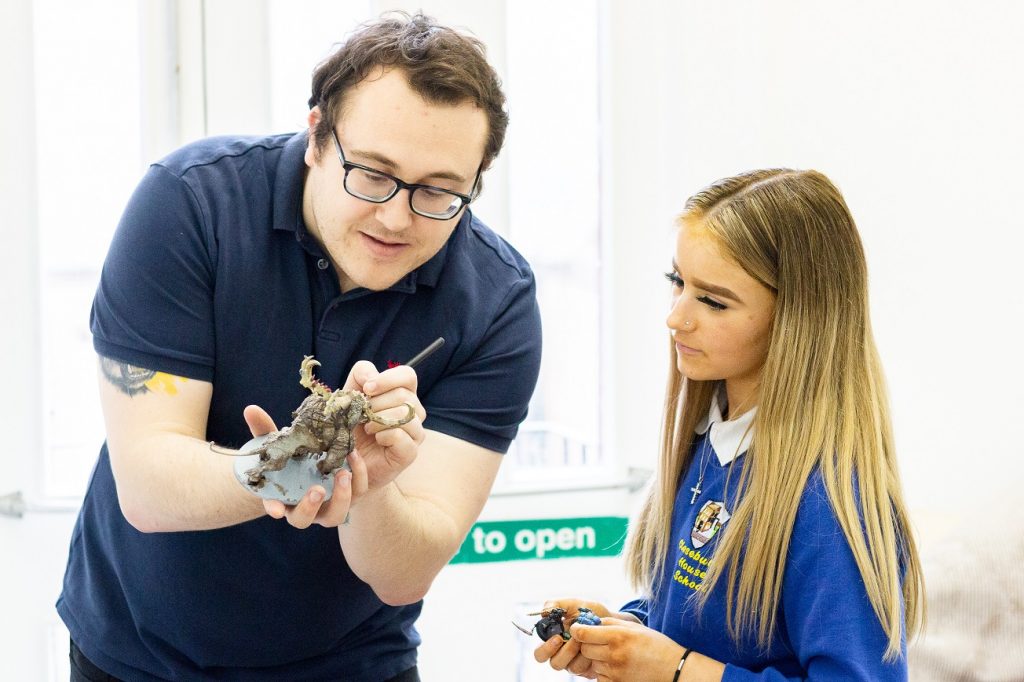New Podcast Episode – Best of Series One
A special Best of Series One from #AutismUnpacked is live! Real voices. Real stories. Real insight.
Colour Mode
News & Events Introducing Warhammer to Closeburn House

Over the last few months, we have been using the sci-fi and fantasy miniatures game Warhammer as a therapeutic tool to connect with students and enable them to build relationships with us as teaching staff and each other.
In Warhammer, players collect forces of miniature plastic models and use them to play out clashes on a tabletop battlefield. Unlike a board game, where players’ moves are restricted to defined areas, Warhammer players freely manoeuvre their units set distances using rulers and rolling dice. Before playing, however, players must first assemble and paint their army miniatures.
Our school Closeburn House which is situated in the heart of Dumfries and Galloway, is a specialist, therapeutic educational establishment attached to a residential care unit, with facilities for both day and residential pupils. We have a good reputation for providing a high standard of education to vulnerable young people with social, emotional, and behavioural difficulties and Autistic Spectrum Disorder.
The hour session a week of Warhammer building, painting, and playing has provided a therapeutic environment for the pupils to relax, de-stress and raise self-esteem by completing small manageable projects together. Pupils worked together, built relationships and mentored one another in the more relaxed setting and behaviours witnessed elsewhere in the school, like refusals, disagreements, arguing, swearing, and absconding would not manifest at the Warhammer club.
It is also worth noting that Warhammer is an accepted hobby in the skills section of the Duke of Edinburgh Award. This means pupils participating in the club can develop these skills as progress towards their award, which is both prestigious and meaningful.
Danny Bennet, Teacher at Closeburn introduced the game and said: “We begin each session by sitting together as a group and sharing paints, brushes, and models. The pupils talk about what they did the week before and excitedly discuss the progress they want to make that day. As their teacher I offer advice and provide some structure, however, the lessons are mostly pupil-led. Consistently the entire room feels settled, calm, and collaborative, with no outbursts, swearing, or pupils standing up and leaving the table. This prolonged type of behaviour is unlike what is usually present in the rest of the school day and the children remark that they felt considerably more settled and relaxed having spent time painting and modelling with their peers. Typically, the pupils can be unwilling to work together and are very competitive but, in this setting, something changes, and the pupils are helpful, supportive, and kind.”
For subsequent sessions, it was decided by pupils that we should hold a painting competition and that the staff and pupils of the school would vote for a winner!
Pupils worked hard on their models and gleefully showed them to each other and to the adults in the room. They theorised about who would win the competition and most of the pupils suggested pupils other than themselves would win. This seemed less about having low self-esteem about their own work and more about praising the work of their peers. The atmosphere in the class was positive and energetic.
With all models painted and presented a winner was chosen! Pupils congratulated the winner with applause and all accepted the vote and were genuinely pleased for the winner who beamed with pride!
Other adults in the school who have observed the lessons have remarked at how calm, focussed and peaceful the pupils have been. During lesson time at the Warhammer club no arguments, disagreements, refusals, or absconding have taken place. It has been observed that pupils who have previously not had a good relationship were far more talkative and cooperative in the Warhammer lessons. These relationships continued more positively out in the wider school.
All students who participated in the Warhammer lessons were polled after each session, asked for their level of stress before the activity and then after. On every occasion, pupils rated their stress and anxiety as significantly lower after the session than what it had been before. Pupils reported feeling calmer, more relaxed, and no longer feeling upset or angry about problems that had happened earlier in the day. One student commented that during the sessions they could open up and talk about things they usually couldn’t for fear of being judged. Whilst at the club they felt listened to and cared for.
Danny added: “My next steps will be to continue the club and aim to build the mastery of the students further in their building and painting. I will also start to introduce the army building aspect of the game so that the pupils can participate in the gaming aspect of the hobby. This I hope will help the children develop deeper relationships with each other and develop further coping strategies for disappointment, competition, loss, and disagreement.”
© Outcomes First Group 2025